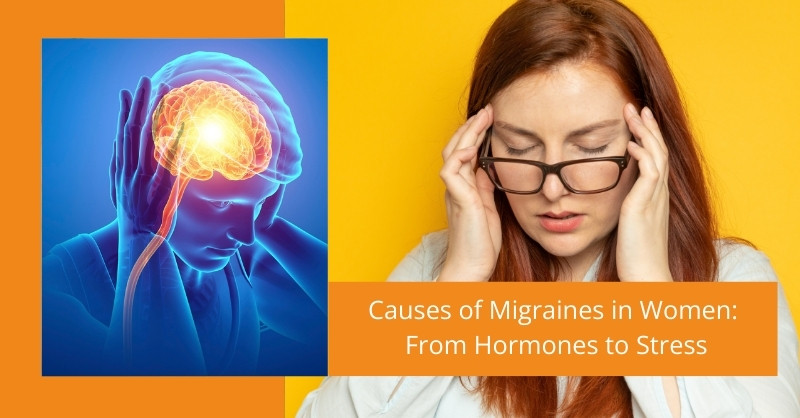Migraines are a common neurological condition that disproportionately affects women. Understanding the causes of migraines in women is essential for effective prevention and management. From hormonal fluctuations to lifestyle triggers, this article explores the most common factors contributing to migraine headaches in women.
Hormonal Causes
One of the primary causes of migraines in women is hormonal changes. Fluctuations in estrogen levels during menstruation, pregnancy, and menopause can significantly impact the frequency and intensity of migraines. For example, menstrual migraines, triggered by the drop in estrogen just before menstruation, are a common phenomenon. Similarly, some women experience migraines during pregnancy or when using hormonal birth control, raising questions like, “Can birth control cause migraines in women?“
Studies indicate that women are more likely to experience migraines during their reproductive years due to hormonal fluctuations. For those wondering “why do women get migraines,” hormonal causes are a significant piece of the puzzle. Menopause, while relieving migraines for some, can exacerbate them for others due to unpredictable hormone levels.
Stress as a Migraine Trigger in Women

Stress is another significant factor among the causes of migraines in women. Chronic stress can lead to tension headaches, which may escalate into migraines. The link between stress and migraines is well-documented, emphasizing the importance of stress management techniques such as meditation, yoga, and regular exercise.
The connection between stress and migraines often creates a vicious cycle. Migraines caused by stress can lead to anxiety, which in turn exacerbates migraine symptoms. Identifying the root causes of stress and taking steps to alleviate it is critical for managing migraines effectively.
Diet and Migraines in Women
Dietary habits play a crucial role in the causes of migraines in women. Certain foods and beverages, such as alcohol, caffeine, and processed foods, are common triggers. For those wondering about the “best foods to avoid if you have migraines,” experts often recommend steering clear of artificial sweeteners, aged cheeses, and foods containing high levels of nitrates.
Dehydration is another dietary factor that can contribute to migraines. Staying adequately hydrated is essential for reducing migraine frequency. Women should also consider maintaining a food diary to identify personal dietary triggers, making it easier to avoid specific foods that may provoke migraines.
Sleep and Migraines in Women
Irregular sleep patterns are another key factor in the causes of migraines in women. Both lack of sleep and oversleeping can trigger migraines. Establishing a consistent sleep schedule can help reduce the risk of migraine headaches in women.
For those asking, “why do women get migraines” due to sleep issues, it is crucial to prioritize quality sleep. Sleep hygiene practices, such as avoiding screens before bedtime, maintaining a cool and dark sleeping environment, and adhering to a fixed sleep schedule, can mitigate migraine risks.
Medication Side Effects
Certain medications, including those for blood pressure, depression, and hormonal treatments, can contribute to the causes of migraines in women. Consulting with a healthcare provider about alternative treatments can be beneficial.
Women taking medications like hormone replacement therapy or contraceptives may experience exacerbated migraine symptoms. For those questioning “can birth control cause migraines in women,” the answer often depends on the type and dosage of hormones involved.
Weather Changes
Environmental factors, such as sudden weather changes, are also among the causes of migraines in women. Fluctuations in barometric pressure can lead to increased migraine episodes in susceptible individuals.
Women who experience migraines triggered by weather changes may benefit from tracking weather patterns and taking preventative measures, such as staying hydrated and avoiding other triggers during high-risk days.
Lifestyle Changes to Prevent Migraines in Women

Addressing the causes of migraines in women often involves a combination of medical and natural remedies. Lifestyle changes, such as maintaining a balanced diet, staying hydrated, and practicing yoga, can significantly reduce the frequency of migraines. Exploring “natural remedies for migraine relief in women” is a proactive step for those seeking alternative treatments.
Additionally, regular physical activity and stress management play pivotal roles in preventing migraines. Women are encouraged to adopt healthy routines that minimize known triggers and enhance overall well-being.
How to Identify Migraine Triggers in Women
Understanding “how to identify migraine triggers in women” is crucial for effective management. Keeping a migraine diary to track potential triggers, such as specific foods, stress levels, or sleep patterns, can provide valuable insights into the most common causes of migraines in women.
Over time, identifying patterns can help women make informed decisions about lifestyle adjustments and seek medical advice tailored to their specific needs. This personalized approach is essential for long-term migraine management.
Conclusion: Addressing the Causes of Migraines in Women
Migraines are a multifaceted condition influenced by hormonal, environmental, and lifestyle factors. By identifying the causes of migraines in women, individuals can take targeted steps to manage and prevent this debilitating condition. From understanding “why do women get migraines” to exploring “lifestyle changes to prevent migraines in women,” this guide offers actionable insights for a healthier, migraine-free life.
While migraines may not always be preventable, understanding their root causes enables women to minimize their impact on daily life. Comprehensive care, combining lifestyle changes and medical interventions, remains the best strategy for addressing the causes of migraines in women.
Read this Article: 
Read this Article: 



